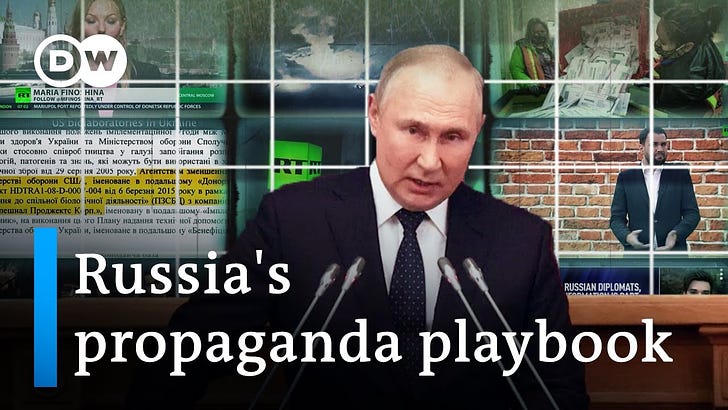In a 2022 analysis of the effects of anti-democracy propaganda, Christopher Nehring observed:
[P]ropaganda and disinformation do not rely on facts and rationality at all. They are concerned with emotions, beliefs, polarization and exaggeration. Neither the political nor the biological man exists and thinks solely in the category of facts. Emotions make up an often unconscious part of our thinking and our experienced reality. In the battle between facts and emotions, the former too often get the short end of the stick.1 [my emphasis]
Always a helpful caution to keep in mind!
Although in the end, facts do matter. Gravity could be described as “just a theory.” But if you jump off a tall building, it’s still going to pull you to a hard landing on the ground.
Nehring is using that observation in making the point that fact-checking in itself is not enough to counter widespread propaganda.
His article focuses particularly on Russian disinformation operations. And his relatively short essay doesn’t necessarily distinguish clearly enough between general political or scare-inducting propaganda and targeted recruitment of sources and actual collaborators.
And while he makes the Russian effort sound formidable, he also cautions against giving it too much credit. In a reference to the 2016 American-election-related “Russiagate” efforts, which some Democrats and liberal publicists were only too glad to credit with incredible sophistication and effectiveness, he writes:
From American party headquarters to the Federal Foreign Office to the [German] Bundestag or multinational companies: no system is safe from the hackers of [the Russian] GRU & Co. But here, too, there is are limitations: they get in, but what they do with the captured information is by no means always a masterful accomplishment. After the "election hack" during the 2016 U.S. presidential election, for example, the same master hackers created rather clumsy websites full of language errors where they wanted to leak their information and thus influence the election campaign. [my emphasis]2
When it comes to political propaganda, the domestic sources of misinformation and demagoguery are usually more of a concern than those directly generated by hostile governments. Those operations can be effective, especially in moments of acute crisis.
(I’ll add here that Nehring makes some questionable generalizations in this article about the legality of targeted assassinations3 by governments.)
Here is a related take from DW News4:
Nehring, Christopher (2022): Geheimdienste 31.10.2022. In: Internationale Politik 2022:06, 104-109. <https://internationalepolitik.de/de/geheimdienste-0> (Accessed 2023-22-01). “Hinzu kommt, dass Propaganda und Desinformation gar nicht auf Fakten und Rationalität setzen. Ihnen geht es um Emotionen, um Überzeugungen, um Polarisierung und Übertreibung. Weder der politische noch der biologische Mensch besteht und denkt alleine in der Kategorie von Fakten. Emotionen machen einen oftmals auch unbewussten Großteil unseres Denkens und unserer erlebten Realität aus. Im Kampf zwischen Fakten und Emotionen ziehen erstere viel zu oft den Kürzeren.” My translation from the German.
“Von amerikanischen Parteizentralen über das Auswärtige Amt bis hin zum Bundestag oder zu multinationalen Unternehmen: Kein System ist vor den Hackern von GRU & Co sicher. Doch auch hier gilt eine Einschränkung: Rein kommen sie, aber was sie mit den erbeuteten Informationen anfangen, ist keineswegs immer eine Meisterleistung. Nach dem „Election Hack" während der US-Präsidentschaftswahl 2016 etwa kreierten dieselben Meisterhacker ziemlich stümperhafte Webseiten voller Sprachfehler, auf denen sie ihre Informationen leaken und so den Wahlkampf beeinflussen wollten.” My translation from the German.
Alston, Philip (2011): Using International Law to Combat Unlawful Targeted Killings: Abstract. In: Fastenrath, Ulrich et al, eds., From Bilateralism to Community Interest: Essays in Honour of Bruno Simma 2011. Oxford Academic. <https://academic.oup.com/book/7421/chapter-abstract/152384845> (Accessed: 2023-13-05).
The strategy behind Russia's disinformation campaigns: DW Analysis. DW News YouTube channel. (Accessed: 2023-13-05).


